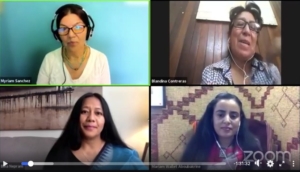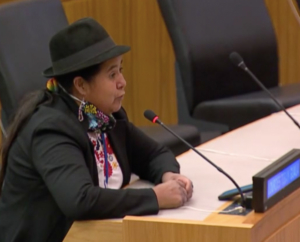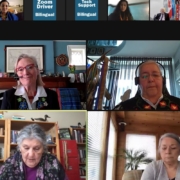Co-PI Update – Mariam Wallet Aboubakrine
Dear members of the Ărramăt team,

The Construction of Peace and Justice in Indigenous Communities through the Conservation of Biodiversity.
From April 19 to 30, 2021, Indigenous Peoples (IP) from the seven socio-cultural regions came together virtually for the annual Session of the United Nations Permanent Forum on Indigenous Issues (UNPFII) whose theme Special was “Peace, Justice and Strong Institutions: The Role of Indigenous Peoples in Achieving Sustainable Development Goal 16”.
I had the honour and the privilege of being able to participate. It allowed me to listen to the questions that concern IPs, to learn from their good examples and their resilience in the face of the COVID-19 pandemic and all the challenges they already face. Among the discussions that were particularly relevant to our research proposal, there was the one under agenda item 4 “Discussion on the six areas of the mandate of the Permanent Forum, economic and social development, culture, environment, education, health and human rights ”, with reference to the United Nations Declaration on the Rights of Indigenous Peoples. It underlined the particular threat to their well-being, health and Indigenous identity, the dispossession of their land, the militarization of their territory and the loss of their languages. The audience welcomed the proclamation of 2022-2032 by the United Nations General Assembly as the International Decade of Indigenous Languages.

Forum member, Lourdes Tibanez, Quechua from Ecuador addressing the audience at its 20th Session.
In addition, under agenda item 6, which partly concerned the Participation of Indigenous Peoples, I mentioned to the virtual plenary the progress made in terms of the participation of representatives of Indigenous Peoples in the work of the United Nations relevant to them. From the first Indigenous mission to the League of Nations, under the Leadership of Deskaheh of the Haudenosaunee Nation, until today. In the days of our elders, the door to this institution was still closed to us. Admittedly, in 2021, we have a forum within the United Nations with an equitable representation of Indigenous peoples and member states under Indigenous leadership, but it remains that, in order to access our bodies, our leaders, our parliamentarians, and our representatives must still register as non-governmental organizations. Other spaces such as the General Assembly and the Human Rights Council are also still closed to us. So, there is still a long way to go so that nothing is decided for us without us and so that we can bring our knowledge, skills and solutions to the decision-making tables. This is how we can ensure a more comprehensive analysis of the issues of human concern and ensure that no one is left behind. You will find my intervention from 1:12 minutes to 1:25 minutes on this link.
Finally, the members of the Authority adopted a draft report (L2, L3, L4, L5, L6, L7, L8) which will soon be available on the website of the authority. The following recommendation is related to ethical aspects of our research proposal Ărramăt ⴰⵔⵔⴰⵎⴰⵜ: “Member States and UN entities should ensure that any activities related to the use of the traditional knowledge of indigenous peoples respect Indigenous peoples’ own protocols and consent agreements for managing access to their traditional knowledge. Strengthening and ensuring the full participation of Indigenous Peoples at all levels is also critical for the design and implementation of climate policies, plans, programs and projects at the local, national and global levels. ” (E/C.19/2021/L.4) However, I find it weak in the sense that it envisages on the one hand the idea that our traditional knowledge is exploited by others and that it is limited to our participation in the response to the climate crisis only. There is an urgent need, as we mentioned in our research proposal, to focus on Indigenous leadership.
In closing, the rapporteur unveiled the topic of discussion of the 21st Session of the body which will be: “Role of corporations and investors in sustainable development and Indigenous Peoples”, as well as its date which will be 25 April to 06 May 2022 at the headquarters of the United Nations in New York.
The regional dialogues will consider: “Indigenous peoples and pandemic recovery” and the thematic discussion will be on “International Decade of Indigenous Languages”.
Tanemert,
Mariam
Watch this video of one of Mariam’s presentations:

 Mariam Wallet Aboubakrine
Mariam Wallet Aboubakrine
